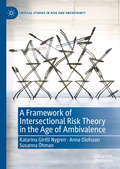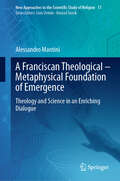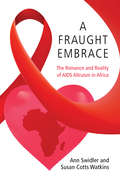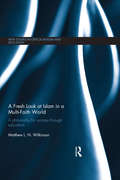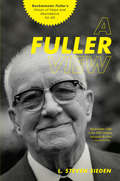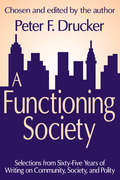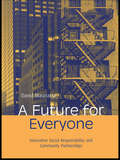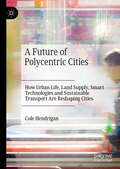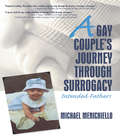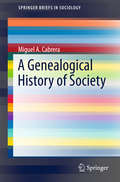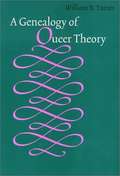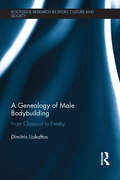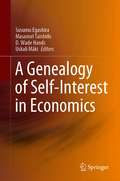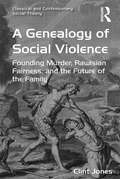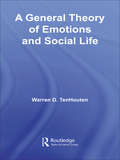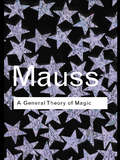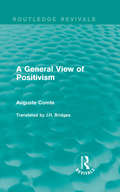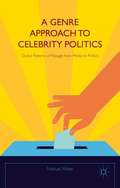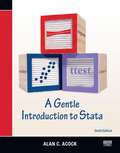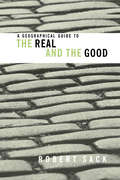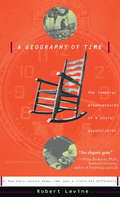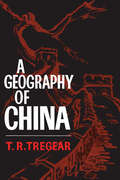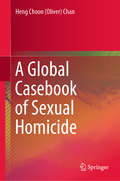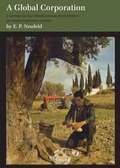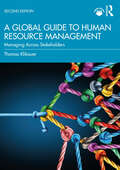- Table View
- List View
A Framework of Intersectional Risk Theory in the Age of Ambivalence (Critical Studies in Risk and Uncertainty)
by Anna Olofsson Susanna Öhman Katarina Giritli NygrenThis book brings feminist theories and concepts to the sociology of risk in an attempt to carve out a framework for intersectional risk theories in times of ambivalence.The authors purport that risk is pervasive in the Global North, and is fast becoming a hegemonic governing principle. In order to understand this crucial aspect of society, sociological risk theories and risk analysis must go beyond power and social inequalities, to incorporate an intersectional risk approach that takes into account gender, race and other critical perspectives. Their proposed framework will provide the tools to assess how risk is situated in different configurations of power, revealing cracks and openings in the weft of power and rethinking risk governance in contemporary society. By utilising an intersectional and nuanced analysis, the everyday understanding, practices and discourses of risk can be explored and better understood. This book will be of interest to scholars and students who value the importance of establishing interdisciplinary networks between risk theory, sociology, politics and more in order to study the contemporary world.
A Franciscan Theological-Metaphysical Foundation of Emergence: Theology and Science in an Enriching Dialogue (New Approaches to the Scientific Study of Religion #17)
by Alessandro MantiniThis book proposes a broad synthesis of the state of the art regarding the debate on the phenomenon of Emergence. Discussing from a theoretical and a theological perspective, it aims to propose a new interpretation, according to the theological and metaphysical framework offered by St Bonaventure and the Franciscan school. Identifying the main concepts, the salient, and questions that characterize the phenomenon of Emergence, the book employs a complex, multilevel and wide-ranging analysis between the wisdom of Bonaventurean theology, metaphysics, and modern scientific and metaphysical knowledge. This book is a must read for scholars and academics interested in new sapiential depths to extract and make the new and the ancient interact.
A Fraught Embrace: The Romance and Reality of AIDS Altruism in Africa (Princeton Studies in Cultural Sociology #72)
by Ann Swidler Susan Cotts WatkinsIn the wake of the AIDS pandemic, legions of organizations and compassionate individuals descended on Africa from faraway places to offer their help and save lives. A Fraught Embrace shows how the dreams of these altruists became entangled with complex institutional and human relationships. Ann Swidler and Susan Cotts Watkins vividly describe the often mismatched expectations and fantasies of those who seek to help, of the villagers who desperately seek help, and of the brokers on whom both Western altruists and impoverished villagers must rely.Based on years of fieldwork in the heavily AIDS-affected country of Malawi, this powerful book digs into the sprawling AIDS enterprise and unravels the paradoxes of AIDS policy and practice. All who want to do good—from idealistic volunteers to world-weary development professionals—depend on brokers as guides, fixers, and cultural translators. These irreplaceable but frequently unseen local middlemen are the human connection between altruists' dreams and the realities of global philanthropy. The mutual misunderstandings among donors, brokers, and villagers—each with their own desires and moral imaginations—create all the drama of a romance: longing, exhilaration, disappointment, heartache, and sometimes an enduring connection. Personal stories, public scandals, and intersecting, sometimes clashing fantasies bring the lofty intentions of AIDS altruism firmly down to earth. Swidler and Watkins ultimately argue that altruists could accomplish more good, not by seeking to transform African lives but by helping Africans achieve their own goals. A Fraught Embrace unveils the tangled relations of those involved in the collective struggle to contain an epidemic.
A Fresh Look at Islam in a Multi-Faith World: A philosophy for success through education (New Studies in Critical Realism and Education (Routledge Critical Realism))
by Matthew L.N. Wilkinson***WINNER: Cheryl Frank Memorial Prize, International Association of Critical Realism.*** A Fresh Look at Islam in a Multi-Faith World provides a comprehensively theorised and practical approach to thinking systematically and deeply about Islam and Muslims in a multi-faith world. It makes the case for a contemporary educational philosophy to help young Muslims surmount the challenges of post-modernity and to transcend the hiatuses and obstacles that they face in their interaction and relationships with non-Muslims and visa-versa. It argues that the philosophy of critical realism in its original, dialectical and metaReal moments so fittingly ‘underlabours’ (Bhaskar, 1975) for the contemporary interpretation, clarification and conceptual deepening of Islamic doctrine, practice and education as to suggest a distinctive branch of critical realist philosophy, specifically suited for this purpose. This approach is called Islamic Critical Realism. The book proceeds to explain how this Islamic Critical Realist approach can serve the interpretation of the consensual elements of Islamic doctrine, such as the six elements of Islamic belief and the five ‘pillars’ of Islamic practice, so that these essential features of the Muslim way of life can help Muslim young people to contribute positively to life in multi-faith liberal democracies in a globalising world. Finally, the book shows how this Islamic Critical Realist approach can be brought to bear in humanities classrooms by history, religious education and citizenship teachers to help Muslim young people engage informatively and transformatively with themselves and others in multi-faith contexts.
A Fuller View
by L. Steven SiedenKnown as a "Leonardo da Vinci of the twentieth century," engineer, designer, inventor, and futurist Dr. R. Buckminster "Bucky" Fuller had a keen awareness that we're all in this together. Understanding that humans don't have aclue about how to operate our fragile Spaceship Earth, Buckminster provided insightful design science solutions to our most challenging issues, including war, overpopulation, housing, increasing inflation, health care, the energy crisis, and much more. For all its genius, Fuller's legacy has yet to be fully discovered. Noted Fuller expert L. Steven Sieden together with Gary Zukav, John Robbins, Lynne Twist, Jean Houston, and many other notable individuals offer inspiring quotations and explanations that make Fuller's life more understandable and accessible. They preserve a voice that calls upon each of us to shift our intellectual and technological resources from creating weaponry to creating sustainability.Winner 2013 COVR award - Gold
A Functioning Society: Community, Society, and Polity in the Twentieth Century
by Peter F. DruckerPeter F. Drucker may be best known as a writer on business and management, but these subjects were not his foremost intellectual concern. Drucker's primary concerns were community, in which the individual has status, and society, in which the individual has function. Here he has assembled selections from his vast writings on these subjects. This collection presents the full range of Drucker's thought on community, society, and political structure and constitutes an ideal introduction to his ideas.The volume is divided into seven parts. The selections in parts 1 and 2 were mostly written during World War Two and in the wake of the Great Depression. Part 3 deals with the limits of governmental competence in the social and economic realm. It contains some of Drucker's most influential writings concerned with the difference between big government and effective government. The chapters in part 4 explore autonomous centers of power outside government and within society. Part 5 contains chapters from Drucker's path-breaking work on the corporation as a social organization rather than merely an economic one. The rise of the so-called "knowledge industries" forms the background for part 6. The concluding part 7 is devoted entirely to Drucker's long essay "The Next Society." Drucker examines the emergence of new institutions and new theories arising from the information revolution and the social changes they are helping to bring about.In organizing these representative writings, Drucker chose to be topical rather than chronological, with each excerpt presenting a basic theme of his life's work. As is characteristic of his efforts, A Functioning Society appeals both the general reader as well as a cross-disciplinary scholarly readership.
A Future for Everyone: Innovative Social Responsibility and Community Partnerships
by David Maurrasse Cynthia JonesThe original essays in this timely collection discuss the many ways to foster innovative and unprecedented collaborations leading to more effective partnerships between major institutions and corporations to poor and disenfranchised communities. Many of today's pressing issues are covered in-depth: bridging the digital divide; community reinvestment; university and corporate partnerships; and corporate responsibility.
A Future of Polycentric Cities: How Urban Life, Land Supply, Smart Technologies and Sustainable Transport Are Reshaping Cities
by Cole HendriganIn this book, Dr Cole Hendrigan examines the options for sustainable transport and land-use planning based on building heights, mixes of land-use, transportation mode capacity and others to build the next generation of parks, housing, commercial and retail spaces along high-capacity rail corridors. Following the paradigm of ‘Transit Oriented Development’, Dr Hendrigan provides unique knowledge and insights on how to best make the transition towards more sustainable and livable cities, offering a practical method to better integrate transport and urban development to this end.
A Gay Couple's Journey Through Surrogacy: Intended Fathers
by Jerry Bigner Michael MenichielloA deeply personal account of the trials and tribulations of the surrogacy journey!Surrogacy&’s been coldly and unjustifiably called "baby buying" and "baby selling" and many states have banned it. But those insensitive terms do not tell the inspiring tale of a couple fiercely wanting to become parents. A Gay Couple&’s Experience with Surrogacy: Intended Fathers is the moving true story of a gay couple&’s decision to have their child through a surrogate mother. With humor and emotion, the author traces their intense experience from the initial decision to have a child through surrogacy on through the entire pregnancy and birth.A Gay Couple's Journey Through Surrogacy chronicles this couple&’s no-holds-barred account of the emotional toll, the legal matters, the financial concerns, and the ultimate fulfillment of parenting a child. A Gay Couple's Journey Through Surrogacy reveals the author&’s answers to these questions: why surrogacy over adoption? which type of surrogacy-traditional or gestational? what were the issues when choosing a surrogate? how much does surrogacy cost? what living expenses are included in the cost? what are the emotional and financial reasons that surrogates choose to bear another&’s child? what are the pitfalls in choosing surrogacy? what are the legal issues-what to beware and what to considerAn excerpt:Before I knew it, I was writing an ad of my own, and I actually posted it. David, of course, had no idea what I was up to. The ad read:"We&’re a gay couple in New York that just celebrated our fourteenth anniversary and we&’ve decided to extend our family. We&’re looking for someone close by and even have a separate apartment available if needed."Nice, huh? Could it be just a little bit more. . . vague? Could my ad have lacked a little more personality? Sure, have our baby and move right in while you&’re doing it! Who the hell would respond to that? I wasn&’t even sure after reading it myself that it made any sense. But what should I have said? What could I have said? I scrambled to find a way to delete it, but couldn&’t.A Gay Couple's Journey Through Surrogacy is a touching memoir that reveals the challenges that face gay and lesbian couples who may be considering either adoption or surrogacy.
A Genealogical History of Society (SpringerBriefs in Sociology)
by Miguel A. CabreraThis book provides a detailed reconstruction of the process of formation of the modern concept of society as an objective entity from the 1820s onwards, thus helping to better understand the shaping of the modern world and the nature of the current crisis of modernity. The concept has exerted considerable influence over the last two centuries, during which time many people have conceived themselves and behave as members of a society, and social scientists have explained human subjectivities and conducts as social effects. For both groups, society exists as a very real phenomenon. Historical inquiry shows, however, that the modern concept of society is no more than a historically contingent way of imagining and making sense of the human world.
A Genealogy Of Queer Theory (American Subjects)
by William B. Turner<p>Who are queers and what do they want? Could it be that we are all queers? Beginning with such questions, William B. Turner's lucid and engaging book traces the roots of queer theory to the growing awareness that few of us precisely fit standard categories for sexual and gender identity. <p>Turner shows how Michal Foucault's work contributed to feminists' investigations into the ways that power relates to identity. In the last decades of the twentieth century, feminists were the first to challenge the assumption that a claim to universal identity -- the white male citizen -- should serve as the foundation of political thought and action. Difference matters. Race, ethnicity, class, gender, and sexuality interact, producing a wide array of identities that resist rigid definition and are mutable. By understanding the notion of transhistorical categories -- woman, man, homosexual, and so forth -- feminist and gay male scholars launched queer theoretical work as a new way to think about the politics of gender and sexuality. <p>A Geneology of Queer Theory probes the fierce debates among scholars and activists, weighing the charges that queer readings of texts and identity politics do not constitute and might inhibit radical social change. Written by a historian, it considers the implications of queer theory for historical inquiry and the distinction between philosophy and history. As such, the book will interest readers of gay/lesbian/bisexual/transgender studies, intellectual history, political theory, and the history of gender/sexuality.</p>
A Genealogy of Male Bodybuilding: From classical to freaky (Routledge Research in Sport, Culture and Society)
by Dimitris LiokaftosBodybuilding has become an increasingly dominant part of popular gym culture within the last century. Developing muscles is now seen as essential for both general health and high performance sport. At the more extreme end, the monstrous built body has become a pop icon that continues to provoke fascination. This original and engaging study explores the development of male bodybuilding culture from the nineteenth century to the present day, tracing its transformations and offering a new perspective on its current extreme direction. Drawing on archival research, interviews, participant observation, and discourse analysis, this book presents a critical mapping of bodybuilding’s trajectory. Following this trajectory through the wider sociocultural changes it has been a part of, a unique combination of historical and empirical data is used to investigate the aesthetics of bodybuilding and the shifting notions of the good body and human nature they reflect. This book will be fascinating reading for all those interested in the history and culture of bodybuilding, as well as for students and researchers of the sociology of sport, gender and the body.
A Genealogy of Self-Interest in Economics
by Uskali Mäki Susumu Egashira D. Wade Hands Masanori TaishidoThis is the first book to describe the entire developmental history of the human aspects of economics. The issue of “self-interest” is discussed throughout, from pre-Adam Smith to contemporary neuroeconomics, representing a unique contribution to economics. Though the notion of self-interest has been interpreted in several ways by various schools of economics and economists since Smith first placed it at the heart of the field, this is the first book to focus on this important but overlooked topic. Traditionally, economic theory has presupposed that the core of human behavior is self-interest. Nevertheless, some economists, e.g. recent behavioral economists, have cast doubt on this “self-interested” explanation. Further, though many economists have agreed on the central role of self-interest in economic behavior, each economist’s positioning of self-interest in economic theory differs to some degree. This book helps to elucidate the position of self-interest in economic theory. Given its focus, it is a must-read companion, not only on the history of economic thought but also on economic theory. Furthermore, as today’s capitalism is increasingly causing people to wonder just where self-interest lies, it also appeals to general readers.
A Genealogy of Social Violence: Founding Murder, Rawlsian Fairness, and the Future of the Family (Classical and Contemporary Social Theory)
by Clint JonesExamining the mimetic theory of René Girard, this book investigates the development of society as a result of an original crime (a murder) that shaped the way the earliest humans organized the social structures we live with today - an analysis that reveals the dangerous structure of the most basic social relationships. With attention to family relationships, A Genealogy of Social Violence sheds light on the processes by which the traditional nuclear family, through the mimetic behaviour of children, embeds violence into human desires and hence society as whole. Challenging the thought of Girard and of Rawls in order to offer a new understanding of justice, this book suggests that in order to achieve a more peaceful society, what is required is not the self-defeating narrative of equality, developed in order to manage the violence engendered by our social institutions, but a reconceptualisation of the nuclear family structure. A striking critique of modern society, which draws on religion, mythology, literature, history, philosophy and political theory, A Genealogy of Social Violence will be of interest to social and political theorists, as well as philosophers working in the area of contemporary social and European thought.
A General Theory of Emotions and Social Life (Routledge Advances in Sociology)
by Warren D. TenHoutenFounded upon the psychoevolutionary theories of Darwin, Plutchik and Izard, a general socioevolutionary theory of the emotions - affect-spectrum theory - classifies a wide spectrum of the emotions and analyzes them on the sociological, psychological and neurobiological levels. This neurocognitive sociology of the emotions supersedes the major theoretical perspectives developed in the sociology of emotions by showing primary emotions to be adaptive reactions to fundamental problems of life which have evolved into elementary social relationships and which can predict occurrences of the entire spectrum of primary, complex secondary, and tertiary emotions. Written by leading social theorist Warren D. TenHouten, this book presents an encyclopaedic classification of the emotions, describing forty-six emotions in detail, and presenting a general multilevel theory of emotions and social life. The scope of coverage of this key work is highly topical and comprehensive, and includes the development of emotions in childhood, symbolic elaboration of complex emotions, emotions management, violence, and cultural and gender differences. While primary emotions have clearly defined valences, this theory shows that complex emotions obey no algebraic law and that all emotions have both creative and destructive potentialities.
A General Theory of Magic (Routledge Classics)
by Marcel MaussFirst written by Marcel Mauss and Henri Humbert in 1902, A General Theory of Magic gained a wide new readership when republished by Mauss in 1950. As a study of magic in 'primitive' societies and its survival today in our thoughts and social actions, it represents what Claude Lévi-Strauss called, in an introduction to that edition, the astonishing modernity of the mind of one of the century's greatest thinkers. The book offers a fascinating snapshot of magic throughout various cultures as well as deep sociological and religious insights still very much relevant today. At a period when art, magic and science appear to be crossing paths once again, A General Theory of Magic presents itself as a classic for our times.
A General View of Positivism: Large Print (Routledge Revivals)
by Auguste ComteIn Comte’s original work on positivism, he attempted to outline a general perception of positivism, how it can be applied to society and how society would work should positivism be applied. J.H. Bridges’ translation, originally published in 1865, this version first published in 1908, manages to simplify and clarify Comte’s views of positivism and how it is related to the thoughts, feelings and actions of humankind as well as how positivism can be applied to philosophy, politics, industry, poetry, the family and the future. This title will be of interest to students of sociology and philosophy.
A Genre Approach to Celebrity Politics
by Nahuel RibkeExploring the transition of celebrities into institutional-electoral politics, the book argues that many insights developed by genre theorists could be highly instrumental to understand the celebrity politics phenomenon. It analyzes the historical and cultural specificity of celebrity politics as it evolved through different countries and cultures.
A Gentle Introduction To Stata
by Alan C. AcockAcock assumes that the user is not familiar with any statistical software. This assumption of a blank slate is central to the structure and contents of the book. Acock starts with the basics; for example, the part of the book that deals with data management begins with a careful and detailed example of turning survey data on paper into a Stata-ready dataset on the computer. When explaining how to go about basic exploratory statistical procedures, Acock includes notes that will help the reader develop good work habits. This mixture of explaining good Stata habits and good statistical habits continues throughout the book.
A Geographical Guide to the Real and the Good
by Robert SackFirst published in 2003. Routledge is an imprint of Taylor & Francis, an informa company.
A Geography Of Time: On Tempo, Culture, And The Pace Of Life
by Robert N. LevineIn this engaging and spirited book, eminent social psychologist Robert Levine asks us to explore a dimension of our experience that we take for granted--our perception of time. When we travel to a different country, or even a different city in the United States, we assume that a certain amount of cultural adjustment will be required, whether it’s getting used to new food or negotiating a foreign language, adapting to a different standard of living or another currency. In fact, what contributes most to our sense of disorientation is having to adapt to another culture’s sense of time. Levine, who has devoted his career to studying time and the pace of life, takes us on an enchanting tour of time through the ages and around the world. As he recounts his unique experiences with humor and deep insight, we travel with him to Brazil, where to be three hours late is perfectly acceptable, and to Japan, where he finds a sense of the long-term that is unheard of in the West. We visit communities in the United States and find that population size affects the pace of life--and even the pace of walking. We travel back in time to ancient Greece to examine early clocks and sundials, then move forward through the centuries to the beginnings of ”clock time” during the Industrial Revolution. We learn that there are places in the world today where people still live according to ”nature time,” the rhythm of the sun and the seasons, and ”event time,” the structuring of time around happenings(when you want to make a late appointment in Burundi, you say, ”I’ll see you when the cows come in”). Levine raises some fascinating questions. How do we use our time? Are we being ruled by the clock? What is this doing to our cities? To our relationships? To our own bodies and psyches? Are there decisions we have made without conscious choice? Alternative tempos we might prefer? Perhaps, Levine argues, our goal should be to try to live in a ”multitemporal” society, one in which we learn to move back and forth among nature time, event time, and clock time. In other words, each of us must chart our own geography of time. If we can do that, we will have achieved temporal prosperity.
A Geography of China
by T.R. TregearThis book is intended primarily for serious students of geography but it will also appeal to the general reader. For this reason technical terms have been used as sparingly as is consistent with correct meaning. Wherever the subject matter permits, the author emphasizes geographical growth and shows the interaction of geographical environment and the human activity and institutions. When originally published in the 1960s China was beginning to change with breathtaking rapidity. These changes are presented here against geographical and historical background. Knowledge of the environmental facts is essential to an appreciation of the political, economic, and social problems that have faced the Chinese people.
A Global Casebook of Sexual Homicide
by Heng Choon ChanThis book comprehensively discusses 13 infamous cases of serial and non-serial sexual homicide committed around the globe in the past four decades (1974–2010). Offering a psycho-criminological perspective, it analyzes the cases theoretically (i.e., contributing and precipitating factors, and offender typology) and considers the practical implications (i.e., investigative and crime-preventive measures, and social services). The first book to offer a glimpse of this topic from a global perspective, it adopts a unique approach—case background and critical analysis. As such it is a valuable source of reference for scholars, clinicians, and law enforcement practitioners wanting to gain a better understanding of this type of violent offender.
A Global Corporation: A History of the International Development of Massey-Ferguson Limited
by Edward Neufeld<p>The international or multi-national corporation has become an important phenomenon in today's business world and Massey-Ferguson is an ideal example of such an organization. Through its predecessor companies it can train its history to 1847, and so it has encountered virtually all the difficulties and developments of the last hundred years in business organization and management science. The development has not been straightforward for it has been much more than the growth of a single company in an expanding market. Management reorganization and the introduction of new management planning and control teachniques contributed a good deal to the company's expansion, and because mergers played a vital role, the history of other companies is also involved. <p>Dr. Neufeld's study concentrates on the years after the Second World War, a period in which the company's international operations became increasingly complex. He records the events that helped to shape the company's character and structure, and at the same time investigates the company's successes and failures in adjusting to a changing national and international business environment. His study reveals why Massey-Ferguson developed into a global corporation, an organization that considers the whole of the international environment when making decisions relating to the allocation of its marketing, purchasing, manufacturing and engineering activities.</p>
A Global Guide to Human Resource Management: Managing Across Stakeholders
by Thomas KlikauerA Global Guide to Human Resource Management is a concise HRM introductory text offering a uniquely non-region-specific approach to people management in international business organisations. The book presents an alternative to standard managerial approaches, reflecting the perspectives of multiple stakeholders (workers, trade unions, states and governments, NGOs) to critically evaluate HRM in practice and, in so doing, enables students to make effective decisions in their own practice, wherever their careers take them. Its accessibility and concision make it well suited to short courses for non-HRM and non-business specialists. This text covers all major introductory topics for non-specialists, introducing the concept and purpose of HRM, through recruitment, people, skills, designing work, promoting health, rewarding success, and successful and ethical people management. This edition includes a new chapter on green HRM. Rich with pedagogical features, the book includes five case studies per chapter to connect theory with practice. It is also supported with a range of instructor materials including online guest lectures, general discussion questions, a glossary, an index, and online documentaries that explain how to manage people. It is essential reading for students interested in Human Resources and Personnel Management, Organisational Behaviour and Development and Workplace Culture.
